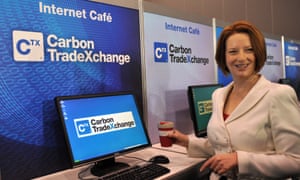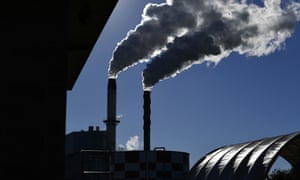When the outgoing head of the OECD urged countries this week to “put a big fat price on carbon”, it might not have gone down well with the Australian vying to replace him.
Mathias Cormann, one of the final four contenders to replace Ángel Gurría as OECD secretary general, was finance minister in the conservative government that abolished a carbon pricing scheme that had driven cuts in Australia’s emissions.
Despite his record of campaigning against the previous Labor government’s “job-destroying carbon tax”, Cormann has put environmental action at the centre of his OECD campaign, arguing the body “can and must provide important global leadership to drive ambitious and effective action on climate change”.
Cormann – who has never contested climate science – brushes off the focus on particular policies, saying each country should be able to follow the strategies that best suit them as part of the overall global task of reducing emissions.
“As secretary general of the OECD I would work with member countries and partner organisations to deploy every policy and analytical capability available through the OECD to help economies around the world achieve global net-zero emissions by 2050,” he tells the Guardian.
Cormann’s climate pivot has caused a mixture of exasperation and bemusement among climate analysts and former political sparring partners in Australia, who say his rhetoric does not match his track record.
Richie Merzian, a former Australian government climate negotiator, rattles off the examples, starting with Cormann’s instrumental role in repealing Australia’s carbon price in 2014.
That followed a heated political campaign against a policy that Julia Gillard’s government implemented in the previous parliamentary term. Cormann had argued the “carbon tax” (actually an emissions trading scheme with a fixed price for the first three years) was “an act of economic self-harm which does nothing to help reduce global emissions”.
“Australia’s carbon price worked,” says Merzian, now the director of the climate and energy program at the Australia Institute, a progressive thinktank. “It reduced Australia’s emissions by 2% over the [two] years it operated and GDP grew 5% over that period. The government wound that back and replaced it with policies that had no credibility, including an ineffective fund to pay polluters to pollute a little bit less.
“Cormann also tried to abolish Australia’s green bank, the Clean Energy Finance Corporation. Thankfully he didn’t succeed. The CEFC and the renewable energy target – which they also tried to kill – and the Renewable Energy Agency – which they also tried to kill – unleashed a wave of investment in clean energy.”
Merzian had a close-up view of many of these developments, having working on climate change in both the Department of Climate Change and the Department of Foreign Affairs between 2009 and 2018, which included acting as Australia’s lead negotiator on adaptation to the UN Framework Convention on Climate Change.
He notes Cormann was also instrumental in backing a Liberal party leadership challenge in 2018 against the then prime minister, Malcolm Turnbull, “who was trying to bring forward a very modest reform to the electricity sector” known as the national energy guarantee. Some conservatives in government ranks wanted to avoid legislating emission reduction obligations and the push led to Scott Morrison becoming prime minister.
“As much as Cormann talks about a shared approach to green recoveries, his government has pushed a gas-fired recovery [from the pandemic] – one that he was involved in pulling together last year as the minister for finance,” Merzian says.
The Guardian understands questions about climate action have come up regularly during Cormann’s campaign activities, including in one-on-one conversations with individual member countries, during the formal interview panel in December, and in further engagements since then.

Cormann is understood to have pushed back at what he saw as misconceptions about Australia’s performance, arguing that Australia has achieved a 16% cut in emissions since 2005, compared with an OECD average of 9%, and that the government is focused on achieving targets in a way that makes sense in an Australian context.
While the Australian government has resisted pressure to formally commit to net-zero emissions by 2050, the Guardian understands Cormann has also pointed to the prime minister’s recent comments that he wishes to reach that goal “as soon as possible and preferably by 2050” – a tentative shift that has sparked a revolt from the National party, the junior Coalition party.
Cormann’s key point in response to climate questions on the campaign trail has been to insist that the mainstream political debate in Australia has not been about whether to take ambitious and effective action on climate change, but about how this is best achieved. He is up against three remaining European candidates who have emphasised climate action.
Cormann tells the Guardian that achieving global net-zero emissions by 2050 “requires an urgent and major international effort” and the Paris agreement targets are “a foundation to build upon and not a limit on our ambition to do more sooner”.
“Different countries will have different means of contributing to the global emissions reduction effort. Australia, for example, is in a prime position to export clean energy to the world, for example through the development of a world-leading hydrogen industry.”
Bill Hare, a veteran climate scientist, campaigner and the founder and chief executive of Climate Analytics, says it is not surprising Cormann is still in play, given the resources that Australia has deployed in support of his candidacy, including a nine-member taskforce in the Department of Foreign Affairs and Trade.
But Hare says if the governments of the UK or the US are serious about their climate ambitions, it will be hard to justify support for Cormann.
“Whilst Cormann’s lobbying points and letters supporting his candidacy are understood to be replete with references to support for ‘ambitious and effective action on climate change’, everyone should know and understand that that is exactly how he and the Australian government have described their approach to action on climate change, which every international assessment has shown to be the exact opposite – unambitious, insufficient and ineffective,” Hare says.
“The question for me is whether governments are going to allow themselves to be fooled by these kinds of empty claims.”
The OECD itself has previously raised the alarm about a lack of clarity and stability in Australia’s climate policy. In 2018, the OECD said Australia had made “little progress in reducing its environmental footprint in large part because frequent changes in core climate-change instruments have created uncertainty for emitters, which has also discouraged energy sector investment”.
The Senate leader of the opposition Labor party, Penny Wong, who despite political disagreements is close to Cormann, says she welcomes his “U-turn on addressing climate change”.
Wong, the party’s foreign affairs spokesperson, chooses her words carefully, given that Labor has offered formal bipartisan support for Cormann’s candidacy: “I’m sure as Mr Cormann has jetted around the world, speaking to leaders, he’s seen how isolated Australia is on this issue – thanks to the Morrison government. Hopefully this newfound insight isn’t just campaigning and he uses this experience to drive a change in the Morrison government’s position.”
Some within Labor see Cormann as more of a pragmatic deal-maker than a conservative ideologue in the mould of Tony Abbott, the first prime minister he served and who was appointed last year to an advisory role with the UK Board of Trade.
Still, Cormann remains closely associated with the Abbott government’s first budget in 2014, which foreshadowed $80bn in cuts to projected growth in health and education spending, cut the rate of age pension increases and tried – unsuccessfully – to impose new fees on visits to doctor surgeries.
“You wouldn’t say he’s an inclusive growth guy based on the 2014 budget,” says a Labor MP, who did not want to be named because the party has formally supported Cormann’s candidacy.

The president of the Australian Council of Trade Unions, Michele O’Neil, says she agrees with her counterparts in the British trade union movement, who this week urged the UK foreign secretary, Dominic Raab, not to back Cormann. The TUC told Raab a Cormann win would set back the fight against poverty and the climate crisis.
O’Neil argues Cormann has had an “ideological fixation on cutting government spending” and he “isn’t the right person to lead economic recovery following the pandemic given that strong government investment and job creation will be central to this effort”.
“The OECD has put low wage growth and rising inequality at the forefront of its economic agenda,” O’Neil says. “During his time as finance minister, Cormann admitted that driving down wage growth was ‘a deliberate design feature of our economic architecture’.”
Cormann says the OECD’s “essential mission of the past – to promote stronger, cleaner, fairer economic growth and to raise employment and living standards – remains its critically important mission for the future”.
There has been speculation about how Cormann would approach China, which last year rolled out trade actions against Australian export sectors worth more than A$20bn, ostensibly in response to the Morrison government’s early call for an independent international inquiry into the origins and early handling of Covid-19. But Beijing has also been unhappy with Australia’s early action in response to security concerns about China, including the introduction of sweeping new laws against foreign interference in 2017 and a ban on Huawei in the 5G network in 2018.
In his OECD campaign material, Cormann cautions that “strategic competition in the region is having global consequences”.
He says China – not an OECD member – is the second-biggest economy in the world and “it contributes a significant share of global growth and is the most important trading partner for a significant and growing number of countries around the world”.
“So of course, it’s in everyone’s interest to have the best possible relationship with China, but we also have to be clear-eyed about some of the pressure points to be worked through.”
Average Rating